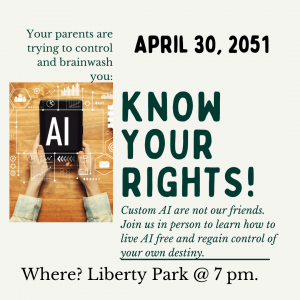For the last few weeks, our readings for this course have discussed algorithms and the challenges that this form of artificial intelligence poses for society. This week, I was introduced to the genre of “Speculative Narratives” which reminds me of a combination between science fiction and dystopian fiction. In two of the required listening podcast episodes for this week, the suggestion is made that in the future AI may be in the form of everyone having their own customized personal assistants that reside in the cloud (Bruff, 2019; Greenspan, n.d.). This actually reminded me of the novel Origin by Dan Brown (2017) that I read a few years ago and one of the main characters in the story, Winston. Winston is the AI personal assistant to a tech billionaire, and Winston resides in “the cloud”. In the book, Professor Langdon (the same character from The Da Vinci Code and The Inferno), sets off to save the day with the help of Winston. While Winston is charming and helpful right from the beginning, as time goes on the book definitely begins to reveal some of the potential challenges posed by this type of technology when it comes to ethics. In addition, the book is a commentary on the lengths that some people will go to hide scientific discoveries and truth when it does not fit their narrative or agenda (Brown, 2017).
All of this really had me thinking about the popularity of Siri, Google Home, and Alexa, as it really is not too far reaching to think about how these “personal assistants” may evolve and change over time as algorithms change and improve. This scenario, in combination with the ongoing problem in our society with the growing availability of disinformation and conspiracy theories online, led me to think about how these AI personal assistants may be programmed to create bubbles that filter all the information that individuals do not want themselves or their families to see. However, what are the consequences of applying too many filters? I decided to write my Speculative Narratives based on these premises, but more specifically, on how this evolving technology might impact children. My first speculative narrative is a story that I wrote and recorded about a 6 year old girl, Vista, on the day that she receives her custom AI personal assistant in the year 2041. A special thanks to my own 6 year old daughter, Brynna, for playing the voice of Vista! My second speculative narrative is much shorter and in the form of a paragraph with an accompanying visual, but it provides a continued speculation of how this technology might impact Vista 10 years later in the year 2051 when she is 16 years old.
Vista, Age 6, 2041: Part 1
Vista, Age 16, 2051: Part 2
The bell rings, it’s lunch time. Vista jumps out of her seat and hurries out of the class to find her friends who are gathering under their favourite tree at the back of the school yard. As usual, they all pull out their devices and echo similar commands, “Hey Nova, play my study music playlist,” says Vista before she wraps her device in a hoodie and stuffs it in her backpack. Everyone else does the same. They then toss their backpacks in a heap a few meters away to make sure that no AIs can hear them. The group has determined that not all AIs are programmed with surveillance to report back to their parents, but some are and you can really never be too careful. Typically, while the group eats lunch they work on the newspaper that they have been secretly been publishing on paper the old-fashioned way just for their friends. They learned about newspapers in history class and decided that was the perfect medium to deliver the truth about what’s happening in the world to a wider audience of teenagers, as they have found that they all have access to slightly different information about what is going on the world and they can get a better picture if the piece it all together. “It doesn’t seem to matter how much I search for information about art, or want to look at career opportunities for artists, Nova just keeps showing me information about the path to becoming a data analyst”, complains Vista. “Just think of all the crypto you would make, if you became a data analyst though…” says her friend Kya before they both burst out laughing. Vista was really good at math and coding so she felt Nova was always pushing her in that direction, but yet, her true love was art. “I wish I had a ton of crypto now, and then I would just get Nova’s algorithm adjusted” says Vista. All of a sudden their friend Jae arrives out of breath from running across the field. “Look what I have” he says as he places a crumbled paper flyer in front of them. “My cousin found it. Do you all want to go with me?” Everyone’s eyes widened as they read the poster and nodded enthusiastically. They were the first generation that was growing up with the restrictions and censorship imposed by an algorithm designed by their parents. They had heard rumours that there teenagers and young adults challenging the legalities, but to date, they had not been able to find any concrete proof. “This is exactly what we have been waiting for,” says Vista.

For additional reflection on this assignment, please visit:
References
Brown, D. (2017, October 3). Origin. Doubleday.
Bruff, D. (Host). (2019, May 20). Episode 60: Future of digital literacies faculty panel [Audio podcast episode]. In Leading Lines. Vanderbilt University. https://soundcloud.com/leadinglines
Greenspan, S. (Host). (n.d.). 01_autopilot off [Audio podcast episode]. In Bellwether. https://soundcloud.com/thisisbellwether
